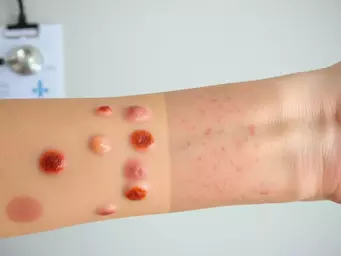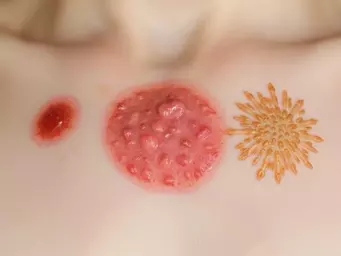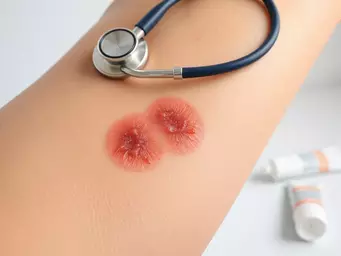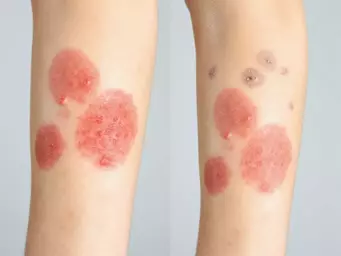Understanding and Managing Eczema

Did you know that early recognition of eczema can significantly improve your quality of life? Understanding this condition is key to managing it effectively. Let's explore some valuable insights into eczema management!
What You Will Learn
- Eczema, or atopic dermatitis, is a chronic skin condition that leads to itchy, inflamed patches on the skin.
- Early recognition of symptoms like intense itching and dry patches can lead to better treatment options.
- Common triggers of eczema include environmental allergens, food allergens, skin irritants, and temperature changes.
- Innovative treatments such as biologics and JAK inhibitors are emerging as effective options for managing eczema symptoms.
- Open communication with healthcare providers plays a crucial role in tailoring effective treatment plans.
Eczema Management: Challenges, Innovations, and Engagement
This visual summarizes key aspects of eczema management, highlighting common triggers, future treatment innovations, and the importance of patient-provider communication.
Common Eczema Triggers
- ‣Environmental allergens (pollen, dust mites)
- ‣Food allergens (dairy, nuts, eggs)
- ‣Skin irritants (soaps, detergents, fragrances)
- ‣Temperature changes (heat or cold)
Innovative Treatments Outlook
- ‣Biologics (targeted inflammation reduction)
- ‣JAK inhibitors (oral medication promise)
- ‣New topical therapies (effective creams)
- ‣Personalized medicine (genetic tailoring)
AI in Eczema Management
- ‣Faster diagnosis via image analysis
- ‣Continuous monitoring (wearable tech)
- ‣Improved treatment plans (data analysis)
- ‣Revolutionizing approach to care
Engaging Your Healthcare Provider
- ‣Ask about specific treatments
- ‣Discuss lifestyle changes
- ‣Clarify follow-up frequency
- ‣Understand medication side effects
Understanding Eczema: What You Need to Know About Atopic Dermatitis
As someone deeply invested in skin health, I want to discuss eczema, also known as atopic dermatitis, which affects many individuals. Eczema is a chronic skin condition characterized by inflamed, itchy, and dry patches on the skin. Understanding this condition is crucial for early recognition and effective management. So, let’s dive deeper into what eczema really is and how it can impact your life!
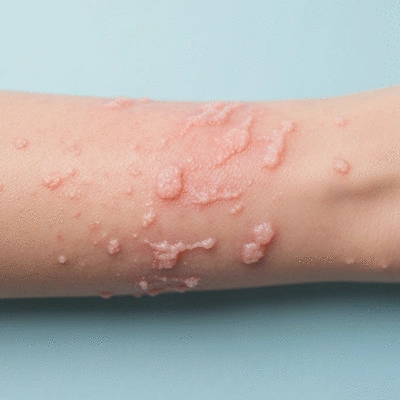
Atopic dermatitis is particularly common in children but can occur at any age. It often runs in families, highlighting a genetic component in its development. Having a clear definition of eczema helps you recognize its symptoms and seek the right treatment sooner rather than later.
Defining Eczema and Atopic Dermatitis
Eczema is more than just a skin rash; it’s a complex condition that can manifest in various ways. The term "atopic" refers to conditions related to allergic reactions, which often accompany this skin issue. This means that individuals with eczema may also experience allergies or asthma. The skin becomes red, itchy, and can sometimes even crack, making it essential to understand what triggers these flare-ups.
For a comprehensive understanding of diagnostic criteria and treatment guidelines, you can refer to the Joint Task Force on Atopic Dermatitis Guidelines.
- Eczema can appear in multiple forms, including:
- Atopic dermatitis
- Contact dermatitis
- Dyshidrotic eczema
- Stasis dermatitis
Recognizing these different types can help you identify your specific condition and seek the appropriate advice. It’s always a good idea to consult a dermatologist if you suspect you have eczema, as they can provide tailored insights based on your skin type and history.
The Importance of Recognizing Symptoms Early
Identifying eczema early can significantly improve your quality of life. Many people experience discomfort and frustration due to persistent itching and visible skin changes. If you notice unexplained itchiness, redness, or dry patches, don’t wait to get a professional opinion. Early recognition can lead to better treatment options and help you manage your skin more effectively!
- Key symptoms to watch for include:
- Intense itching, particularly at night
- Red or brownish-gray patches on the skin
- Dry, sensitive skin
- Thickened, cracked skin (lichenification)
By keeping an eye on these symptoms, you can take proactive steps toward alleviating discomfort and potentially preventing flare-ups.
Common Triggers of Eczema: Identifying Allergens and Irritants
Understanding what triggers your eczema is a critical part of managing the condition. Common triggers can include environmental factors, food allergens, and even stress! Here are some well-known triggers that many people with eczema might encounter:
- Environmental allergens (pollen, dust mites)
- Food allergens (dairy, nuts, eggs)
- Skin irritants (soaps, detergents, fragrances)
- Temperature changes (extreme heat or cold)
Identifying and avoiding these triggers can help you manage your eczema and reduce flare-ups. At What Are Rashes, we encourage you to keep a journal noting when flare-ups occur—this can provide invaluable insight into your personal triggers.
Pro Tip
Did you know? Keeping a detailed journal of your eczema flare-ups can be incredibly beneficial. By noting down what you eat, the products you use, and environmental factors on the days you experience symptoms, you can identify potential triggers more effectively. This proactive approach empowers you to make informed choices and discuss them with your dermatologist, leading to personalized treatment strategies that work best for you!
Ongoing Challenges and Future Directions in Eczema Management
As we continue to explore the complexities of eczema, it's vital to stay informed about the ongoing challenges in managing this condition. At What Are Rashes, I’m committed to providing you with the latest insights that can help you navigate these hurdles effectively. Eczema treatment is not static; it evolves with ongoing research and emerging innovations. So, what does the future hold for eczema management?
Research into more effective treatments is constantly evolving, and understanding these developments can help us find better solutions. I believe that keeping an eye on the horizon will empower you to make informed decisions about your skin health!
Innovative Research: The Future of Eczema Treatments
With the growing body of research surrounding eczema, several innovative treatments are currently being explored. Some of the exciting advancements include:
- Biologics: These are targeted therapies that can reduce inflammation in severe cases of eczema.
- JAK inhibitors: These oral medications are showing promise in effectively managing eczema symptoms. Recent studies continue to highlight their efficacy, as noted in research published on PubMed.
- New topical therapies: Research is underway to create more effective creams and ointments with fewer side effects.
- Personalized medicine: Tailoring treatments based on individual genetic makeups is becoming a reality!
These treatments signify a shift toward more personalized and effective management strategies, helping to improve the quality of life for those living with eczema.
The Role of AI in Diagnosing and Monitoring Eczema
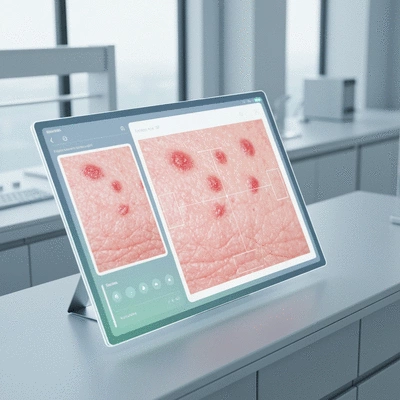
Artificial intelligence (AI) is making waves in healthcare, particularly in diagnosing and monitoring skin conditions like eczema. AI tools can analyze skin images and provide insights that may assist healthcare providers in making more accurate diagnoses. Here are some potential benefits:
- Faster diagnosis: AI can recognize patterns in skin conditions much quicker than traditional methods.
- Continuous monitoring: Wearable tech can track symptoms and provide real-time data to both patients and dermatologists.
- Improved treatment plans: By analyzing vast amounts of data, AI can suggest the most effective treatment options for individuals.
While this technology is still in its early stages, the prospects are promising and could revolutionize how we approach eczema management.
Public Awareness and Education on Eczema Management
Finally, increasing public awareness and education about eczema is essential. Many people still lack understanding of the condition, which can lead to mismanagement and unnecessary distress. Here are some ways we can enhance awareness:
- Community workshops: Hosting sessions that educate about eczema management can empower individuals!
- Online resources: Providing reliable information on websites like What Are Rashes helps demystify eczema.
- Support networks: Creating forums where individuals can share their experiences fosters community and understanding.
By promoting awareness and education, we can help those struggling with eczema feel less isolated and more empowered to take control of their skin health.
Engaging with Your Healthcare Provider: Key Takeaways
Your relationship with your healthcare provider plays a crucial role in effectively managing eczema. Making the most out of your appointments can lead to better outcomes and a clearer understanding of your treatment plan. Let’s explore some key strategies!
Questions to Ask About Your Eczema Treatment Plan
When visiting your dermatologist, it’s important to come prepared with questions that can guide your discussion. Here are some I recommend:
- What specific treatments do you recommend for my type of eczema?
- Are there any lifestyle changes I should consider?
- How often should I follow up to monitor my condition?
- What side effects should I be aware of with my current medication?
Asking these questions not only shows your commitment to your care but also helps you stay informed and engaged in the decision-making process.
Encouraging Open Communication for Better Outcomes
Open communication with your healthcare provider is essential. Don’t hesitate to express your concerns or ask for clarifications. Remember, the more your doctor understands your experience, the better they can tailor a treatment plan for you!
Establishing trust can lead to a more productive relationship, ensuring that your needs are met throughout your eczema journey.
Finding the Right Dermatologist for Your Eczema Needs
Choosing the right dermatologist can make a significant difference in managing your eczema. For resources on finding qualified professionals and understanding treatment options, the American Academy of Dermatology provides valuable guidelines.
- Has experience specifically with eczema treatments
- Is open to discussing various treatment options
- Encourages questions and fosters a collaborative environment
Finding a dermatologist who aligns with your values and needs can enhance your care and empower you to take charge of your skin health.
Frequently Asked Questions About Eczema Management
What is eczema (atopic dermatitis)?
Eczema, or atopic dermatitis, is a chronic skin condition characterized by inflamed, itchy, and dry patches on the skin. It often has a genetic component and can be associated with allergies and asthma.
Why is early recognition of eczema symptoms important?
Early recognition of symptoms like intense itching, redness, or dry patches can significantly improve your quality of life by leading to better and more effective treatment options and helping to manage flare-ups more effectively.
What are common triggers for eczema flare-ups?
Common triggers include environmental allergens (pollen, dust mites), food allergens (dairy, nuts, eggs), skin irritants (soaps, detergents, fragrances), and temperature changes (extreme heat or cold).
What are some innovative treatments for eczema?
Innovative treatments include biologics (targeted inflammation reduction), JAK inhibitors (oral medications), new topical therapies (effective creams), and personalized medicine based on individual genetic makeup.
How can I effectively communicate with my healthcare provider about my eczema?
Prepare questions about specific treatments, lifestyle changes, follow-up frequency, and medication side effects. Open communication and expressing your concerns help tailor a treatment plan that best suits your needs.
Conclusion: Navigating Eczema Management with Confidence
As we wrap up this section on ongoing challenges and future directions in eczema management, I hope you feel more equipped to navigate your journey. Understanding the latest research, leveraging technology, and engaging with your healthcare provider can lead to better management of this complex condition.
Remember, you’re not alone on this journey! Empower yourself with knowledge, actively participate in your care, and take the steps necessary for effective eczema management. Let’s work together towards healthier, happier skin!
Recap of Key Points
Here is a quick recap of the important points discussed in the article:
- Eczema, or atopic dermatitis, is a chronic skin condition characterized by inflamed, itchy, and dry patches.
- Early recognition of symptoms like intense itching or red patches can significantly improve management.
- Common triggers include environmental allergens, food allergens, skin irritants, and temperature changes.
- Innovative treatments, such as biologics and JAK inhibitors, are emerging to improve eczema management.
- AI technology may enhance diagnosis and treatment by providing faster insights and continuous monitoring.
- Engaging with your healthcare provider through open communication is crucial for effective treatment plans.













